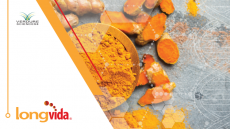Raw bee pollen may not have gastrointestinal benefits: Study

The scientists examined the effects of bee pollen supplementation in a rat model on the enzymes implicated in gastric mucosal homeostasis. These included cyclooxygenase-1 (COX-1), cyclooxygenase-2 (COX-2), inducible nitric oxide synthase (iNOS) and a biomarker—asymmetric dimethylarginine (ADMA). Increased activity of the ADMA/DDAH-1 signaling pathway is associated with the development of gastric mucosal damage.
“To the best of our knowledge, our study is one of the first to describe the influence of bee pollen supplementation on gastric mucosa, and the first to report the usage of unprocessed bee pollen on it,” the researchers wrote in the journal Nutrients. “Therefore, our research helps to fill a research gap about the effects of the consumption of bee pollen in a form that is easily accessible and usually consumed by dietary supplement users—dried bee pollen without any further processing.”
Raw bee pollen
The study contained major differences when compared to most of the existing research on bee pollen’s properties. In this study, bee pollen was not processed in a laboratory, as the scientists intended to use it as consumers do, in a semi-raw state. This means it is not processed after being dried by the producer. The researchers referenced other papers in which bee pollen was administered in the form of purified extracts of bee pollen and bee pollen flavonoids.
Additionally, pellets of bee pollen are covered in a tough pollen coat made from a cellulosic inner layer and an external layer made of sporopollenin. This decreases the ability to digest the pollen, which often means it passes through the intestinal tract without the absorption of its nutritional values, the study noted. Bee pollen can also contain contaminants such as pesticides, metals, mycotoxins and pyrrolizidine alkaloids. In addition, the chemical composition of bee pollen is diverse and dependent on its place of origin, species of pollinator bee and pollinated plant.
Study details
The study randomly assigned 20 male rats to four equal groups: two sedentary (non-running); control sedentary and bee-pollen-supplemented sedentary; and two running—control running and bee-pollen-supplemented (running). In both levels of activity, one group was the control and one was supplemented with multi-flower bee pollen sourced near Lublin, Poland.
All rats in running groups were running five times a week, five minutes each time, at an average velocity of 6 km/h.
When the researchers examined the organs of the rats, they found that bee pollen supplementation resulted in a reduction in COX-1 levels in both physically active and sedentary rats, while it had no statistically significant effects on COX-2 levels. Downregulation of COX-1 leads to a decrease in the synthesis of PGE2, which is known for its protective effect on the gastric mucosa, the researchers noted.
“What is more, in our study, bee pollen intake resulted in elevated levels of iNOS in the supplemented group,” they wrote. “These results do not suggest the gastroprotective effects of bee pollen supplementation.”
Levels of ADMA appeared to be lowered by bee pollen supplementation compared to the control running group, which could be viewed as a sign of mild gastroprotection. ADMA is a marker of mucosal disorder in the stomach and a potential therapeutic target in mucosal injury treatment. The researchers highlighted that this finding does not correspond with the rest of the study results and that physical exercise was found to lower plasmatic levels of ADMA.
“Taken together, the reasons stated above explain why the results of our research should not be considered as contradictory to the previous reports about the properties of bee pollen but rather as complementary to them,” the researchers explained. “Rather, they put more emphasis on why functional foods should be subject to control in terms of their actual active ingredient content and with regard to their processing methods and potential contaminants.”
Further research should be geared toward identifying methods of bee pollen processing that allow it to express its positive impact on stomach health, they added.
Source: Nutrients
doi: 10.3390/nu16010037
“All That Glitters Is Not Gold: Assessment of Bee Pollen Supplementation Effects on Gastric Mucosa”
Authors: Paweł Oszczędłowski et al.














